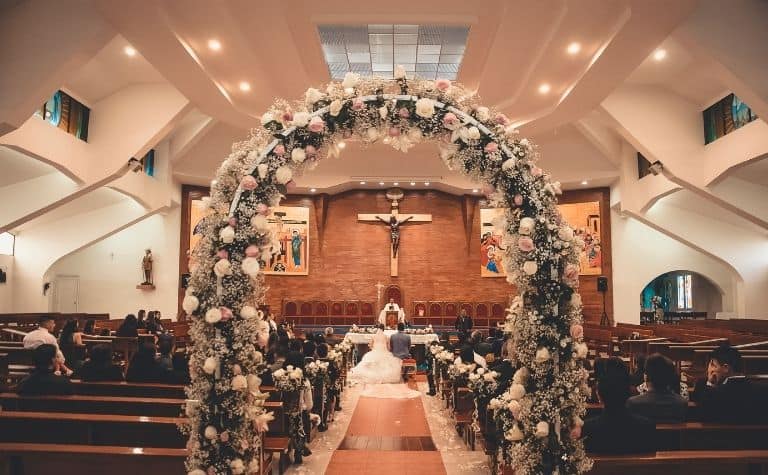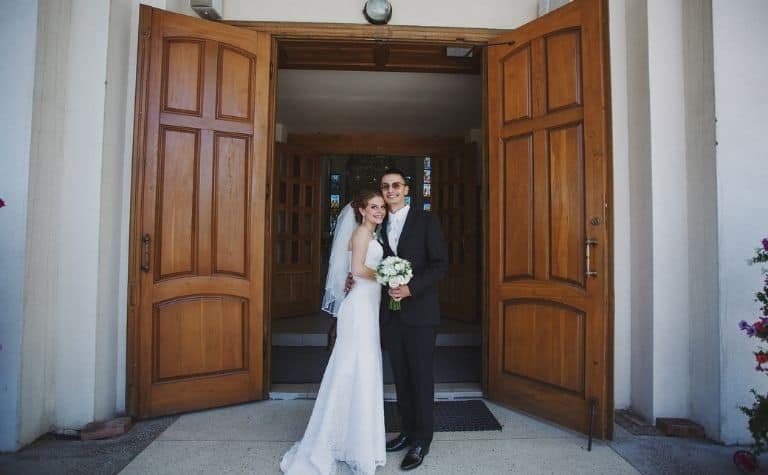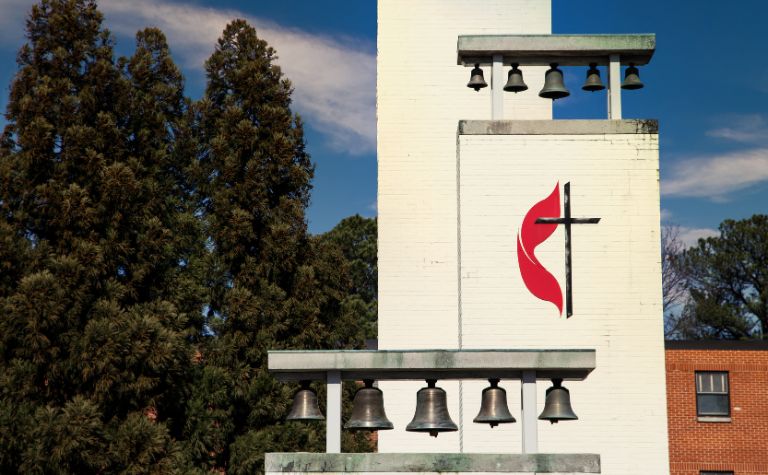Methodism, like most major Christian denominations, holds marriage in high esteem, which raises questions about divorce. However, some Christian traditions are more strict than others regarding people who have experienced a divorce. This reality invites the question if divorced people can get married in a Methodist Church.
Divorced people can get married in a Methodist Church. However, some conservative strains of Methodism require that the divorce fall within biblical parameters, which means the marriage ended for a biblically acceptable reason. Liberal Methodist congregations permit a wide variety of remarriages.
Further questions about the subject rise to the surface: What is the Methodist view of divorce? What are Methodist weddings like, and where can they occur? Read on to discover answers to these critical questions.

What Is the Methodist View on Divorce?
The Methodist perspective of divorce first begins with a biblical view of marriage. The United Methodist Church, the largest Methodist denomination in the world, with around twelve million members, affirms that God’s intention for marriage is a monogamous relationship between one man and one woman. (Also see Why Do Methodist Churches Change Pastors?)
Although this is the denomination’s official position, there is a wide range of opinions concerning this doctrine within the local churches of the UMC, especially as it relates to homosexuality. The practice of local churches does not necessarily match the official denominational position.
The denomination invites disagreement, “While the church has official statements regarding homosexuality, all members can disagree with the church’s positions and can advocate for change in policy. That process happens through General Conference, the only body that speaks officially for the church. At every General Conference since 1972, global delegates have grappled with differing views as they made decisions about whether or how to include LGBTQ people in the church.” [1]
Nevertheless, the fact that the UMC maintains a traditional view of marriage speaks to the seriousness with which orthodox Methodists view marriage. In their opinion, God intends marriage for life, and, among other purposes, it is designed to aid in the holiness of both the individuals and the couple. (Also see Do Methodists Believe In the Saints?)
Thus, it makes sense that most orthodox Methodists reject divorce that is done flippantly or for insignificant reasons. All major Methodist denominations consider divorce only to be an option only after the couple has tried counseling and all other efforts by the couple have been exhausted.
Although Methodists do not consider marriage a sacrament, they believe it shows Christ’s relationship with the Church. Accordingly, Christians should not abandon it lightly.
However, despite this high view of marriage, the UMC is more permissive in divorce than some other branches of Christianity. (Also see Do Methodists Pray to Mary?)
In their Book of Discipline, the UMC allows for divorces in situations where the couple is “estranged beyond reconciliation.” The context of this statement suggests that the couple has tried counseling and other measures but that nothing has succeeded in reviving the health of the marriage. [2]
The UMC does not prevent divorced people from remarrying. This practice differs from the views of John Wesley, one of the founders of the Methodist tradition, along with his brother Charles Wesley and friend and colleague George Whitefield.
John Wesley viewed the remarriage of divorced people as a sort of polygamy. “All polygamy is clearly forbidden in these words, wherein our Lord expressly declares, that for any woman who has a husband alive, to marry again is adultery.”
Although a marriage might end in the sight of the law, a person remains spiritually bound to their spouse for life. This view is more strict than that of the founders of other major Protestant denominations, such as Martin Luther or John Calvin.
Generally speaking, Methodists no longer hold to this view of remarriage, except for perhaps individual churches within more theologically conservative Methodist denominations. (Also see What Do Methodists Believe About Death?)

What Are Methodist Weddings Like?
Methodist weddings share many similarities to a Methodists worship service. Along with all the typical wedding components, Methodist services often include singing, scripture reading, a short sermon, prayer, and sometimes communion. These services bear witness to the fact that this is the beginning of Christian marriage. (Also see The Methodist Symbol: 5 Interesting Facts)
Because of this, a Methodist wedding is not just about the bride or couple but about the communion of all believers. It is all about reaffirming the covenant with God that began at baptism. At the same time, as they enter into union with one another, they also enter into union with God.
To uphold them in this union, the minister asks for the blessing of the parents and the family. Marriage is not an individual affair. Instead, it is something that takes place within the context of the community. [3] Methodist weddings express Methodism’s core values: holiness and love. (Also see Methodism vs. Pentecostalism: What’s the Difference?)
When talking about whether people should get married or stay single, John Wesley emphasized the importance of choosing the option that will better enable people to serve the Lord.
For some people, remaining single will allow them to lead a life of single-minded holiness. For others, the difficulty of loving their spouse produces a level of holiness that would be difficult to achieve while unmarried.
Near the end of a UMC wedding, the pastor often says to the couple: “Go to serve God and our neighbor in all that you do.” In a Methodist understanding of the Christian life, every believer, whether married or single, has the same vocation: to honor God through holy living. (Also see Methodism vs. Lutheranism: What’s the Difference?)

Can Methodists Get Married Outside a Church?
Methodists may marry outside the church, but it is up to the discretion of the local pastor whether they are willing to officiate at the wedding. The reason that a couple might desire to get married in a different venue could have many reasons, but one of the main ones might be an interfaith marriage. (Also see Methodist vs. Baptist: What’s the Difference?)
Since marriage is not considered a sacrament, some Methodist pastors are willing to marry couples where one of them is of a different denomination or even of another faith.
In addition, in some circumstances, certain Methodist pastors are willing to marry couples where one of the people is not a Christian at all. In this case, the layout and liturgy of the wedding may change from that of a typical Methodist wedding service.
The only real official limiting factor in The United Methodist Church is that the couples be of the opposite sex. However, this might soon change, as The United Methodist Church might split concerning differences of opinion on homosexuality. (Also see Methodism vs. Anglicanism: What’s the Difference?)
Methodists who wish to marry within a Methodist church must usually go through premarital counseling with the pastor who will officiate the wedding. This practice is the case even if one of the two getting married is not a Methodist or Christian.
However, the practice of each local Methodist church may vary. Different Methodist denominations have different wedding formats and liturgies. However, there is usually an option to modify the service to the couples’ wants and needs. [4]
References:
[1] Source
[2] Source
[3] Source
[4] Source
Related Questions
Methodism and Anglicanism are distinct branches of Christianity, though they have a closer relationship to each other than to other denominations and traditions. Because of their unique connection,...
The Methodist Church and the Roman Catholic Church both value doctrine and practice. Both traditions also believe they faithfully follow the teachings of Jesus of Nazareth, and they agree on...
